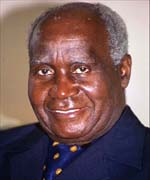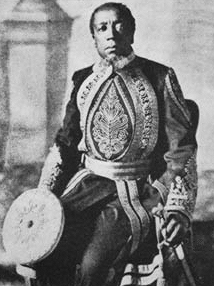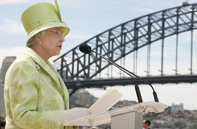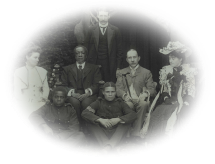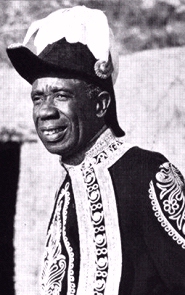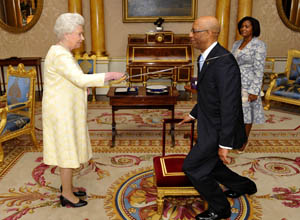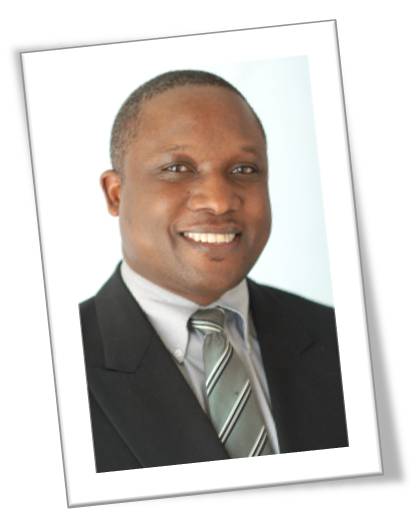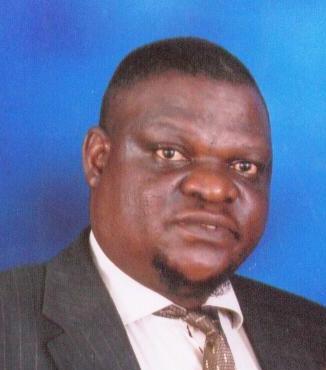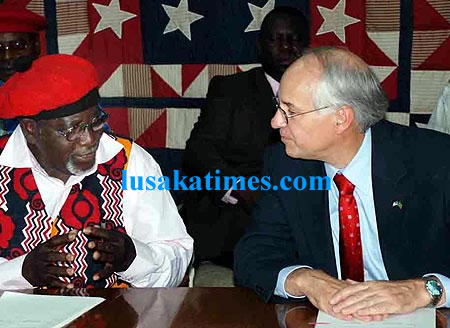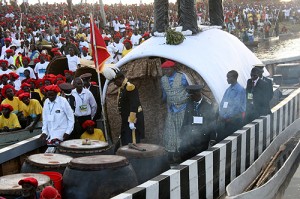Zambia: Mongu youths protest omission Barotse agreement from Draft Constitution
Youths in Mongu this morning protested against Police officers who were stopping them from an unlawful assembly. The youths explained to the police officers that their meeting was to discuss the omission of the Barotse agreement of 1964 in the draft constitution. In the process of stopping them from assembling unlawfully, the youths started throwing stones at police officers and wounded one of them. The youths allegedly burnt a motor vehicle registration number AAP 3277 belonging to Misheck Kolobeka which was hired by MTN Zambia for their sensitization shows.
The youths also vandalized Kalemoni and town market police posts and freed all detainees from the police cells. They have also removed flags from schools and at the stadium where the inter trades sports competition are taking place. The youths have further threatened to beat up anyone who will be holding independence activities tomorrow. Efforts to find out the condition of the police officer who was wounded proved futile by press time as he was out in the field for duties.
ZANIS
Zambia: Politicians urged not to politicise the Barotse Agreement
The Bishops Council of Zambia has cautioned opposition politicians not to aggravate the Barotse agreement by politicizing the issue. In a statement released to ZANIS in Mufulira today, Council President Bishop Peter Chinyama said the Barotse agreement is a serious matter that can bring serious political tension and division in the country if not well handled. Bishop Chinyama observed that some opposition politicians are trying to gain cheap political mileage over the Barotse agreement a situation he said would aggravate the whole matter.
He urged the opposition politicians to try and promote national unit instead of dividing the country by peddling their selfish political agenda. He advised the opposition politicians to realize that first President Dr. Kenneth Kaunda was not unwise when he worked towards uniting the entire country including the Barotseland through the motto One Zambia One Nation that held the country together since independence.
Bishop Chinyama further urged politicians who were claiming to speak on behalf of the people of Western Province to also realize that Western Province had highly educated people and successful politicians who fully understand the documents and implications of the agreement. He said the elite from the Western Province would have done something if harmonizing the agreement could be helpful to the province and the nation at large. He however commended government for the way it handled the matter.
Recently PF Leader Michael Sata was quoted in some section of the media as saying that he was ready to help the people of Barotseland gain independence from the rest of Zambia.
ZANIS
Related News:
Zambia: ‘Sata fanning tribalism on Barotse Agreement’
Former Kasenengwa Member of Parliament Timothy Nyirenda has said Patriotic Front (PF) leader Michael Sata is allegedly promoting tribalism by raising people’s emotions over the Barotse Agreement. And former PF secretary general Edward Mumbi has said Mr Sata’s championing of the Barotse Agreement is one of his several methods to seek popularity in the media. Mr Nyirenda said it was disheartening for the PF president to continue exciting Zambians with his “wild” views on the long-discarded Barotse Agreement.
He said such acts amounted to promoting tribalism and advised Mr Sata to unite the citizens under the popularly agreed motto of ‘One Zambia, One nation’. In yesterday edition of The Post, Mr Sata was quoted as having said the Barotse agreement was real and nobody could gloss over it. Mr Sata said the people of Western Province had the right to demand what belonged to them. But Mr Mumbi said the opposition leader’s populist views were a clear demonstration of his desperation to get to State House at any cost. He said it was irresponsible for any leader to seek to divide the people of Zambia as a means of achieving his political goals.
Mr Mumbi said it was strange that Mr Sata was raising issues about the Barotseland Agreement, which he did not do when he served under former presidents Kenneth Kaunda and Frederick Chiluba. “It is irresponsible for Mr Sata to start inciting Zambians to these levels. In the first place, he could not defend the Barotse Agreement when he served under Dr Kaunda.
“In the Chiluba administration, Mr Sata was in the Cabinet but could not defend the agreement. Now that he is in the opposition, he is defending it and making populist statements in the media,” Mr Mumbi said. And a political activist in Chipata, Gideon Zulu has said it is sad that Mr Sata is working to divide the Zambian people. Mr Zulu, who is managing director of Sawaza Investments, said in an interview yesterday that Mr Sata should allow the country to enjoy the peace it was known for worldwide.
[ Times of Zambia ]
Related News:
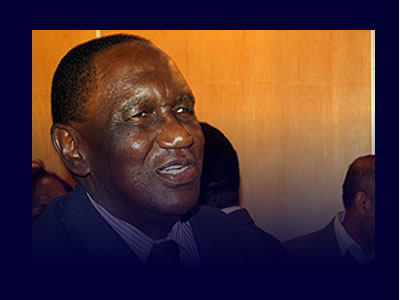
Don’t be cheated on Barotseland - Wina
By KASUBA MULENGA VETERAN politician Sikota Wina has cautioned the people of Western Province not to be cheated by some politicians promising that they will review the Barotseland Agreement if they assume power.
Mr Wina said at a media briefing at his Mimosa farm house in Lusaka on Friday that such politicians are merely attempting to hoodwink the people of Western Province because there is no mention of secession or provision for separate development in the agreement. He said it is unfortunate that most of the people who talk about the agreement have never even read it in its entirety to understand the meaning of its content.
“Those championing the restoration of the Barotseland Agreement have no case. I have studied the entire document and I don’t think this country is prepared to start a fresh debate to review it,” he said. And Mr Wina said he and his wife, Princess Nakatindi, decided to call for a press conference to clear the misunderstanding over the Barotseland Agreement which may threaten national security and retard development if left unchecked. Mr Wina said Government shall ensure that in the discharge of its financial responsibility, Barotseland is treated fairly and equitably in relation to other sections of the country.
“Now it can be noted that in the entire document, there is the continuous reference to Barotseland as an integral part of the Republic of Zambia. There is no mention of secession or provision for separate development,” he said. Mr Wina said equitable sharing of the national cake has always created divisions even in developed countries but that although Western Province is badly hit by lack of investment, it still receives a fair share of national resources as evidenced by President Banda’s recent commissioning of the multi-billion dollar Mongu-Kalabo and Senanga-Sesheke roads.
He wondered why some disgruntled politicians have continued attacking President Banda when he is working hard to take development to Western Province, just like any other part of the country. Mr Wina said there is no doubt that Patriotic Front president Michael Sata appointed Inonge Wina as his national chairperson in an attempt to ride on the popularity of the Wina name in Western Province.
“This should not hoodwink the Lozi people. As the eldest living son of the late Ngambela Wina (former Prime Minister of Barotseland), I will not allow my father’s name to be abused politically and for dubious purposes,” he said. And Princess Nakatindi appealed to all peace-loving Zambians not to judge political leaders by their tribes but by the quality of leadership they are offering to the country. “Are they a unifying factor or are they out there just for the sake of power only? Next year, this country is headed for emotional but sober judgement of our leaders,” she said.
She said when President Mwanawasa died, President Banda led the country through a peaceful transition.
Princess Nakatindi said when he became President, Mr Banda embarked on an ambitious infrastructure development programme countrywide. “That is your man for the leadership of this country during these trying times when even developed countries such as Britain, America and Greece are faced with serious recessions and job losses,” she said.
The Barotseland Agreement was signed on May 8, 1964 in London between then Northern Rhodesia Prime Minister Kenneth Kaunda and Sir Wina Lewanika III, the Litunga of Barotseland and the British Secretary of State for Commonwealth Affairs, Duncan Sandys. “Whereas it is the wish of the Government of Northern Rhodesia and of the Litunga of Barotseland, his council and the chiefs and people of Barotseland that Northern Rhodesia should proceed to independence as one country and that all its people should be one nation."
“And having regard to the fact that all treaties and other agreements subsisting, Her Majesty the Queen of the United Kingdom and the Litunga of Barotseland will terminate when Northern Rhodesia becomes an independent sovereign republic and Her Majesty’s Government in the United Kingdom will thereupon cease to have any responsibility for the Government of Northern Rhodesia and of the Litunga of Barotseland to enter into arrangements concerning the position of Barotseland as part of the Republic of Zambia, to take the place of the treaties and other agreements hitherto subsisting between the Queen and the Litunga of Barotseland,” part of the preamble of the agreement reads.
Mr Wina said the treaties provided that the Lozi King Lewanika had been granted protectorate status by Britain through the Lochner Concession of June 1890, in return for giving Cecil Rhodes’ BSAC monopoly over mining and commercial rights in his territory. He said this monopoly could have been earning BSAC fat royalties up to 1986.
Mr Wina said as Zambia’s independence approached, UNIP, under Dr Kaunda, refused to be troubled by the treaties which were said to cover over 200,000 square miles of territory, extending up to present day Copperbelt Province.
He said the Zambian constitution of 1964 had a strong Bill of Rights which provided protection of private ownership and no clause could be changed, except by national referendum which provided for a two-thirds majority of votes cast.
“In the view of the UNIP leadership at the time, we regarded this clause in the constitution as having been enshrined in the constitution to safeguard the mineral royalties the BSA Company had obtained from King Lewanika through the 1890 treaties which could remain in effect until 1986,” he said. Mr Wina said shortly after independence, a referendum was held on June 17, 1969 which cleared the matter by granting the powers to change the constitution through Parliament.
He said this development helped to resolve the issue of mineral royalties and closed the chapter over BSAC, accompanied by the withdrawal of the Litunga’s rights to grant processing licenses and mining leases.
And Mr Wina said the Zambian constitution included provisions relating to the protection of human rights and fundamental freedoms of individuals, the judiciary and the public service.
He said all the provisions were meant to have full force and effect in Barotseland and the Zambian Government would accord recognition of the Litunga under customary law of Barotseland.
,
The radio interview was based on the contents of the following article below, which appeared on Lusaka Times. It is surprising to see how people resort to insults and get carried away emotionally and avoid dealing with facts. Unfortunately this issue will not be resolved by who insults the most, nor by fighting. This is a legal issue and it has to be resolved. There are courts that deal with treaties and agreements. It cannot be resolved by the NCC. It is above the NCC. It is an International Treaty, and must be regarded as such. However, dialogue is very important so people can be educated and begin to understand the importance of the issue. Barotseland Agreement 1964 is a National issue. It is not youth protesting.
Zambia: The Barotseland contention
By Godwin M Kaluwe
The recent protest in Western Province on Saturday, Oct. 23, 2010, resulting in very serious injuries and one death was something that should never have happened. But the government’s reckless behavior by ignoring Western province submissions to the new constitution has outraged the people of Barotseland. This is a good example of how civil wars are born. One little spark is capable of igniting a huge and destructive fire.
All this came about in August 2010, following the release of the final draft of the constitution. It was discovered then that all the submissions from western province were not included. Someone essentially thought they were not that important, and that Zambia can do just fine without them. Turned out to be a big mistake and recipe for disaster. Prior to this incident, when asked if he would ever thank the people of WP for tilting the presidential election results in his favor; president Banda is believed to have said; ” I did not ask for their votes.” As if that was not enough, the Vice President of the Republic of Zambia went to Western province and made a very troubling statement at the Ku-fuluhela gathering, which is reverse of Ku-omboka 2010. He publicly told the people; ” A Mulozi will never be president of Zambia.” People were so shocked that the Induna who was translating for him collapsed and passed out. Without an apology, he further demanded for another translator. The final nail on the unitary state coffin came when the constitution submissions from western province were thrown out of the draft. People who were in denial of government agenda can now smell the coffee. Hence the events of that fateful Saturday, after three requests to legally acquire public permit to hold a public meeting were denied by the pro Barotseland freedom advocates, not secessionists,
Barotse Agreement 1964
What many people do not understand is that the WP submission included a review of the Barotse Agreement 1964, which was the vehicle for the unitary state of the Republic of Zambia, without which the boundary between Zambia and Barotseland would have been the line of rail from Copper belt to Victoria falls. When King Lewanika signed successive treaties back in 1890, that claimed a vast area of Northern Rhodesia, he protected North-Western province from the Portuguese, Copper belt and Luapula from the French and Belgians, Northern and Eastern provinces from the Germans, and the whole Nation of Zambia was preserved as we know it today. This is the reason Zambia is known as King Lewanika’s country or Kingdom. Lewanika is a nickname, his real name was Lubosi. He acquired Liwanika name as people remembered his ability to unite tribes and Nations. Of the 73 plus Zambian languages, 31 are from Barotseland. In truth there is no tribe called Lozi. Bulozi or Barotseland is a Nation or Kingdom consisting of different tribes and peoples who have come to be known as Malozi today. There is no Lozi versus Nkoya, Mbunda, Luvale, Nyengo, Toka, Leya, Mbukushu, Mboela, Cokwe, Mweenyi, Kwangwa, Simaa, Subia, etc. Lozi is citizenship not a tribe. But those who want to devide and rule erroneously or purposely designate Lozi versus all of the above.
The following are implications of not including Western Province submissions:
- Technically and by default Barotseland ceases to be part of Zambia. Barotse Agreement 1964 was the glue of the union of the two nations
- Zambia cannot hold Barotseland accountable for stay, to an agreement Zambia no longer respects or considers abrogated.
- The Zambian Government will create a peaceful political atmosphere to help Barotseland revert to her original status, by referendum or other, if necessary.
- All Barotseans residing in the main-stream Zambia will be free to have dual citizenship or choose to stay wherever they want.
- The rest of the Zambians residing in Barotseland will choose to stay or have dual citizenship and live wherever they want.
- The Royal establishment resumes the role of reorganizing their government with the Litunga as King of Barotseland.
- The two governments will discuss boundary modalities without a fight, under AU and UN supervision
- The natural boundary being Kafue river running west side of Itezhi-tezhi passing through Namwala and Mulobezi area to Livingstone.
- Zambia takes Copper belt and the predominantly Lozi speaking people of Livingstone continue to be in Barotseland
- Kabompo and Zambezi will choose to stay in Zambia or be free with Barotseland
- The government of Barotseland will not seek to retrieve original parts of Barotseland now occupied by other countries like Kwando area in Angola, Caprivi Strip in
- Namibia, Kasane area in Botswana, and Victoria falls town to the border with Hwange, in Zimbabwe.
- Barotseland will be a good neighbor of Zambia and the surrounding nations.
- Barotseland will join Common wealth nations, UN, AU, SADC and other.
- There is no treasonable charge against freedom of speech and expression of self-determination
- The Republic of Zambia under the surveillance eye of the International community will be a benchmark of a peaceful transition in Africa.
One of the objectives of Barotseland Peace Foundation, as a non profit and an apolitical organization, is to advocate for peace and facilitate for peaceful and transparent deliberations regarding conflict resolutions. Therefore, Both Zambia and Barotseland will benefit greatly by working with BAPF. We invite all other peace loving and peace making entities to join us in this matter, so we can resolve this matter without bloodshed. Self-Determination is imbedded in human rights, a privilege for all people everywhere in the world. There is a distress call from the people of Barotseland. The International community should not wait until it turns into Rwanda, Sudan, or Bosnia. Now is the time to respond and prevent war! Ki naako!!!
RESOLUTIONS
Of the 2012 Barotse National Council
held at Limulunga on March 26-27th.
PREAMBLE
We the people of Barotseland having constituted and deliberated as a National Council on 26th to 27th March, 2012 in Limulunga in the Barotseland Nation on the status and future of the Barotseland Nation in the Republic of Zambia, hereby declare this day of Tuesday March 27, 2012 at the close of our deliberations as follows:
Recognizing that the Barotseland Agreement 1964 provided the basis on which Barotseland became an integral part of Zambia and took the place of the treaties and other agreements hitherto subsisting between Her Majesty the Queen and the Litunga of Barotseland.
Acknowledging that the Barotseland Agreement 1964’s aim was to provide a safe guard against encroachment on the powers of the people of Barotseland to self-government by Central Government of Zambia.
Realizing that the new state of Zambia, which came into being on October 24, 1964, never ratified the Barotseland Agreement entered into between Barotseland and Northern Rhodesia Governments on May 18, 1964, and despite its non- ratification, unilaterally abrogated by Zambia in 1969.
Aware that the unilateral termination of the Barotseland Agreement 1964 by the government of Zambia is a violation of the right of Barotseland to self-determination and repudiation of the purported integration of the territory of Barotseland into Zambia.
Recognizing that successive Zambian governments never took steps necessary to ensure that the laws for the time being in force in the Republic of Zambia are not inconsistent with the provisions of the Agreement.
Aware that successive Zambian governments continued to undermine the modernization of Barotseland institutions and governance required to run an independent modern state as well as meddle in the national affairs of Barotseland, resulting in conflict in some sections of the Barotseland Nation.
Recalling that successive Zambian governments illegally administered and controlled Barotseland by intimidation and force since October 24, 1964, despite continued protests from the people of Barotseland against such transgressions, including futile calls to restore the Agreement.
Knowing that Barotseland’s right to autonomy on governance and political affairs is inborn and has been protected by treaties since the first encounter with foreign powers.
Rejecting the expectation or notion by the Zambian government that we surrender our autonomy as expressed in the Barotseland Agreement 1964 in return for economic development.
We now inform Zambia and the international community that we finally accept the unilateral nullification and the abrogation of the Barotseland Agreement 1964 by the Zambian government, which action has freed Barotseland from being part of Zambia.
In line with the Post liminium doctrine we can no longer be obliged to honor an international Agreement that the other party has nullified and abrogated, which has reverted us to our original status.
POSITION STATEMENT:
We the people of Barotseland declare that Barotseland is now free to pursue its own self-determination and destiny.
We are committed to a peaceful disengagement with the Zambian government in the same manner that we attempted integration as a state within Zambia.
We call on the international community to support our legitimate right to self-determination as a people and nation by resolving as follows:
1. That all the people in Barotseland shall continue to enjoy the centuries old harmonious peaceful co-existence by all the ethnic groups as had always been the case.
2. That the people of Barotseland shall not, in any way, take kindly to any individual, authority or groups of individuals bringing the institution of the Litungaship into public ridicule and disrepute by making derogatory remarks with intent to undermine the authority of the Litunga and Barotse Government.
- The Zambian government to immediately refrain from committing actions of violence and intimidation against the people of Barotseland.
4. That no part of Barotseland shall be ceded to any other country.
5. The Barotse Government should immediately formalize the DECLARATION OF DISPUTE with the Zambian Government on the basis that the Zambian Government has violated and unilaterally abrogated the Unity Treaty whose purpose was to bind the two territories of Barotseland and the rest of Zambia, and also notify the SADC, AU, Commonwealth and United Nations of that fact.
6. The people of Barotseland shall exercise their right to revert Barotseland to its original status as a sovereign nation, so that the people of Barotseland shall determine their political, cultural, social and economic development.
7. The Barotse Government is mandated to, within 30 days, request the United Nations to oversee the transition process.
8. The Barotse Government should, within 30 days, put in place a transition process leading to taking over all government functions in Barotseland and the election of the KATENGO Legislative Council.
- We mandate the Barotse Government to immediately engage the Zambian government with the sole purpose of working out transitional arrangements towards self-determination for Barotseland within the shortest possible time under the auspices of the United Nations.
10. The Barotse Government should embark on reforms to modernize its functions and enhance accountability and transparency.
11. The Barotse Government should immediately establish a Secretariat comprising of such number of Officers as required to run such an office.
12. The Barotse Government should convene the next BNC at the end of June 2012 to receive reports on the progress on the above resolutions.
Submitted by:
| BNC RESOLUTIONS COMMITTEE | |||
| Full Names | Position in Committee | Title / Institutions | Signature |
| Mr.Mutungulu Wanga | Chairman | Chairman / MOREBA | |
| Mr. Mwangelwa Akapelwa | Secretary | Induna Mayunyi / Namuso | |
| Mr. Mungandi Mungandi | Member | Secretary / MOREBA | |
| Mr. Namiluko Imwaka | Member | Namuso | |
| Mr. Lubinda Nyaywa | Member | Induna Amuikuteile/Mwandi | |
| Mr. Chazele Mulasikwanda | Member | Secretary / BFM | |
| Mr. Afumba Mombotwa | Member | Chairperson / Linyungandambo | |
| Mr. Mwangelwa M-Lewanika | Vice Secretary | Member / MOREBA | |
Approved by the Barotse National Council, on this 27th day of March, 2012, as signed by:
Clement W. Sinyinda Batuke Imenda
NGAMBELA MUKULWAKASHIKO
1. The Commission of Inquiry
2.
3.
4.
5.
6.
